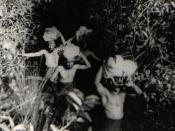The Kalapalo Indians of Central Brazil are one of a few surviving indigenous cultures that is uniquely protected by a national reserve in lowland South America. Through no effort of their own, they have been isolated artificially from Brazilian social and economic influences that reach almost every other Indian tribe in Brazil. This unusual situation has made it possible for the Kalapalo's culture to be undisturbed by the outside world and the surrounding tribes. Much of Kalapalo life is run through a central concept or an ideal of behavior, called ifutisu. This is an infinite ideological concept that is represented in many ways in social life and ideal organization among the Kalapalo.
The area in which the Kalapalo live is in the northeastern Mato Grosso state called Upper Xingu Basin. There are four unintelligible languages by groups in this region. This makes the Upper Xingu Basin linguistically diverse, but with many of the groups still sharing the same social and ideological features.
It is very difficult to trace back the origins of Kalapalo life because of the integration of the many different and culturally diverse groups in the Upper Xingu Basin. So, many of systems of kinship classification, marriage practices, ceremonial organizations, status allocation, and religious beliefs are consistent with cultural rules and social practices and not with the original system. Many of the modern local groups can only reconstruct their own history which is in limited detail, these systems can't be isolated completely from the existing society.
The two most important social units in Upper Xingu society are the village and the household groups. Both the village and household can be considered corporate in that both control rights to territorial resources, acts as a unit when performing certain economic and ceremonial activities. Members of a household group...



Kalapalo Indians of Centrl Brazil
I was wondering if the student researched the information from, one book or several k-studies, and if so what were the names of the books.
5 out of 5 people found this comment useful.